ACC518 - Climate Risk Disclosure: An Analysis of Accounting Thought
VerifiedAdded on 2022/11/18
|17
|2860
|321
Essay
AI Summary
This essay examines the increasing importance of accounting for climate risks, focusing on the role of the Australian Accounting Standards Board (AASB) and the Auditing and Assurance Standards Board in ensuring adequate disclosure in financial statements. It discusses the materiality judgments required in preparing financial statements, the impact of climate-related disclosures on financial assets, and the need for auditors to understand and challenge assumptions related to climate risks. The essay also explores investor actions concerning climate risk, the significance of the Task Force on Climate-related Financial Disclosures (TCFD), and the financial risks associated with climate change. Furthermore, it delves into the IASB framework, emphasizing the assumption that financial statement users possess a reasonable understanding of business, economics, and accounting, while also acknowledging the potential costs for individuals to gain such understanding.
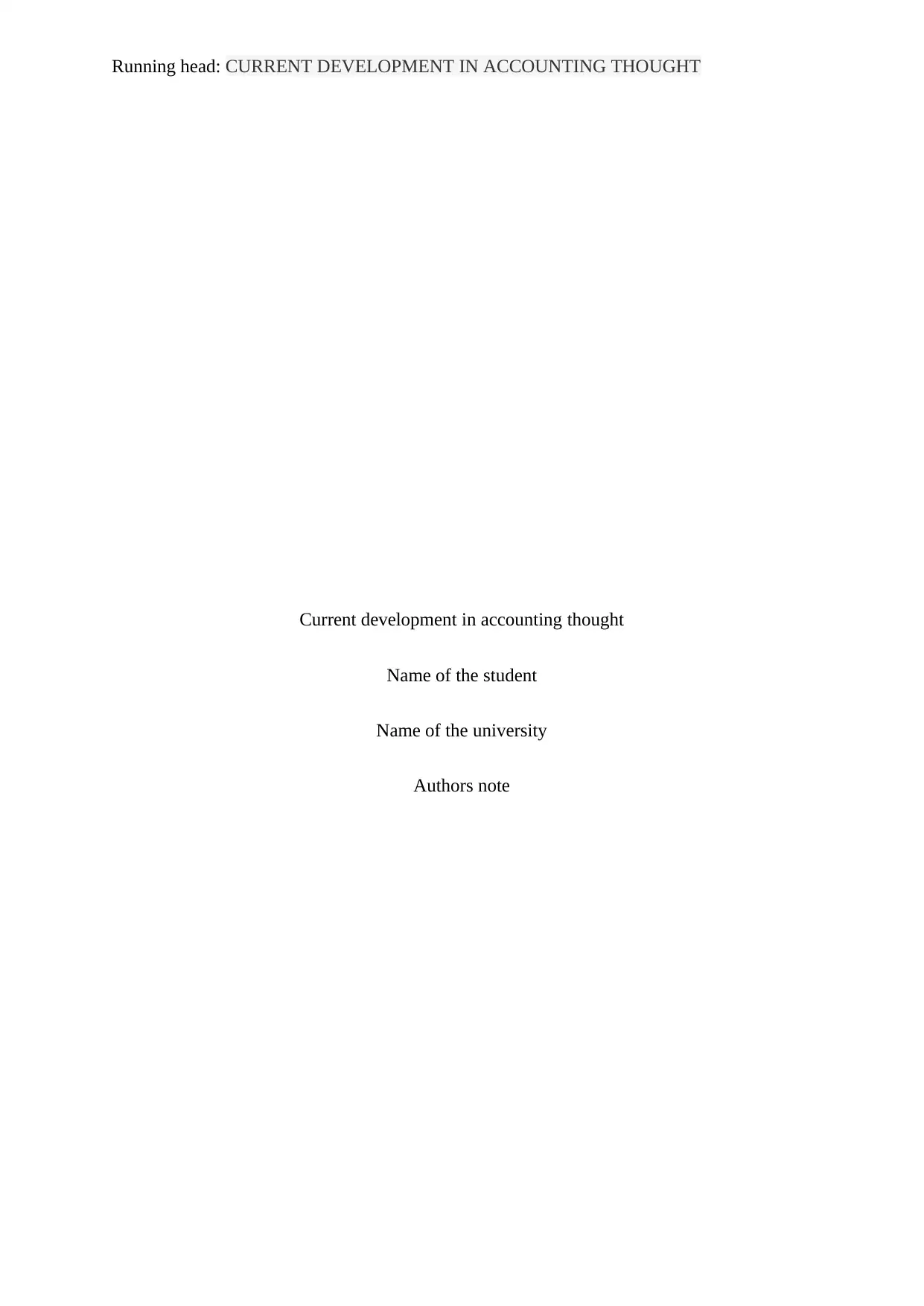
Running head: CURRENT DEVELOPMENT IN ACCOUNTING THOUGHT
Current development in accounting thought
Name of the student
Name of the university
Authors note
Current development in accounting thought
Name of the student
Name of the university
Authors note
Paraphrase This Document
Need a fresh take? Get an instant paraphrase of this document with our AI Paraphraser
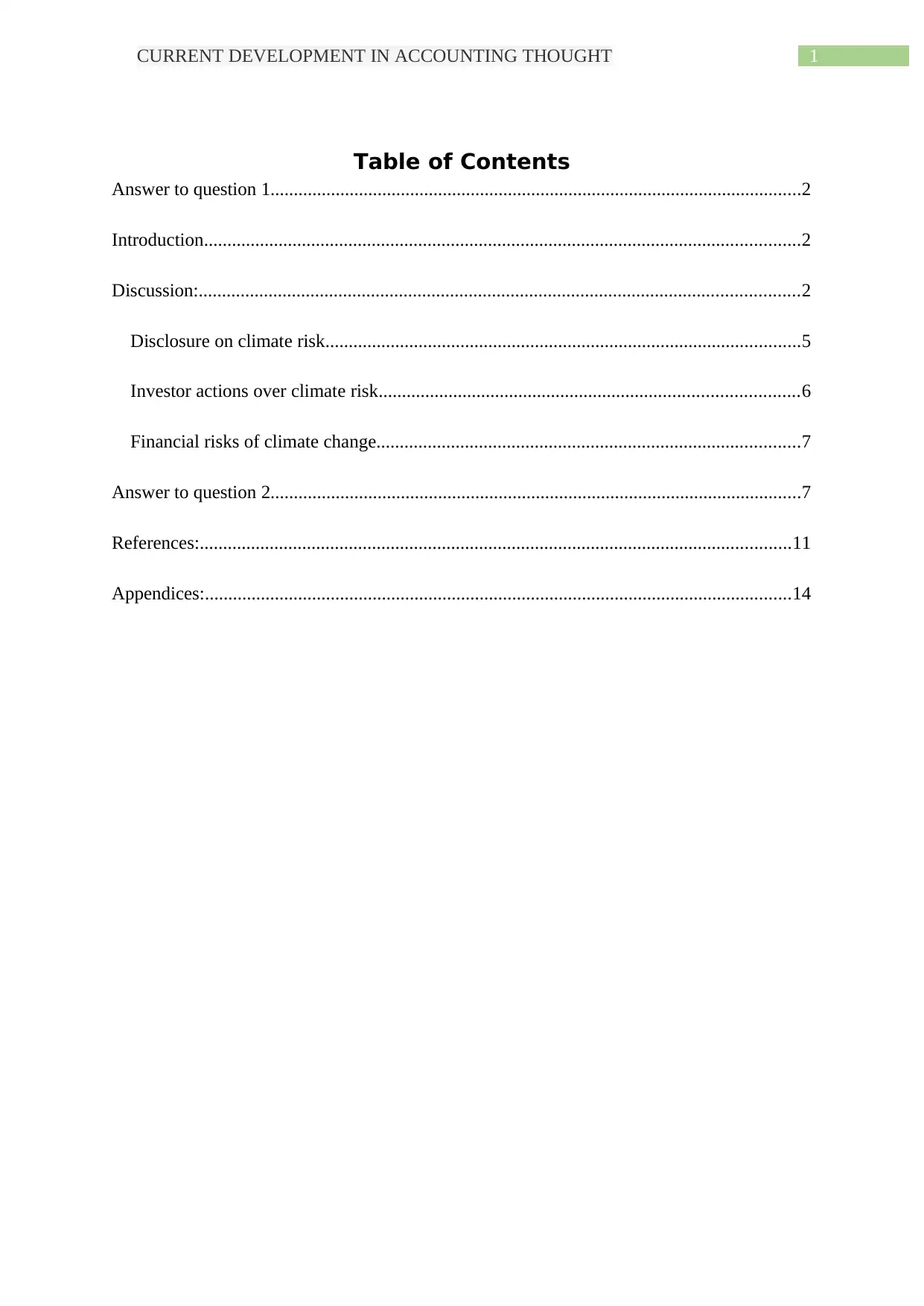
1CURRENT DEVELOPMENT IN ACCOUNTING THOUGHT
Table of Contents
Answer to question 1..................................................................................................................2
Introduction................................................................................................................................2
Discussion:.................................................................................................................................2
Disclosure on climate risk......................................................................................................5
Investor actions over climate risk..........................................................................................6
Financial risks of climate change...........................................................................................7
Answer to question 2..................................................................................................................7
References:...............................................................................................................................11
Appendices:..............................................................................................................................14
Table of Contents
Answer to question 1..................................................................................................................2
Introduction................................................................................................................................2
Discussion:.................................................................................................................................2
Disclosure on climate risk......................................................................................................5
Investor actions over climate risk..........................................................................................6
Financial risks of climate change...........................................................................................7
Answer to question 2..................................................................................................................7
References:...............................................................................................................................11
Appendices:..............................................................................................................................14
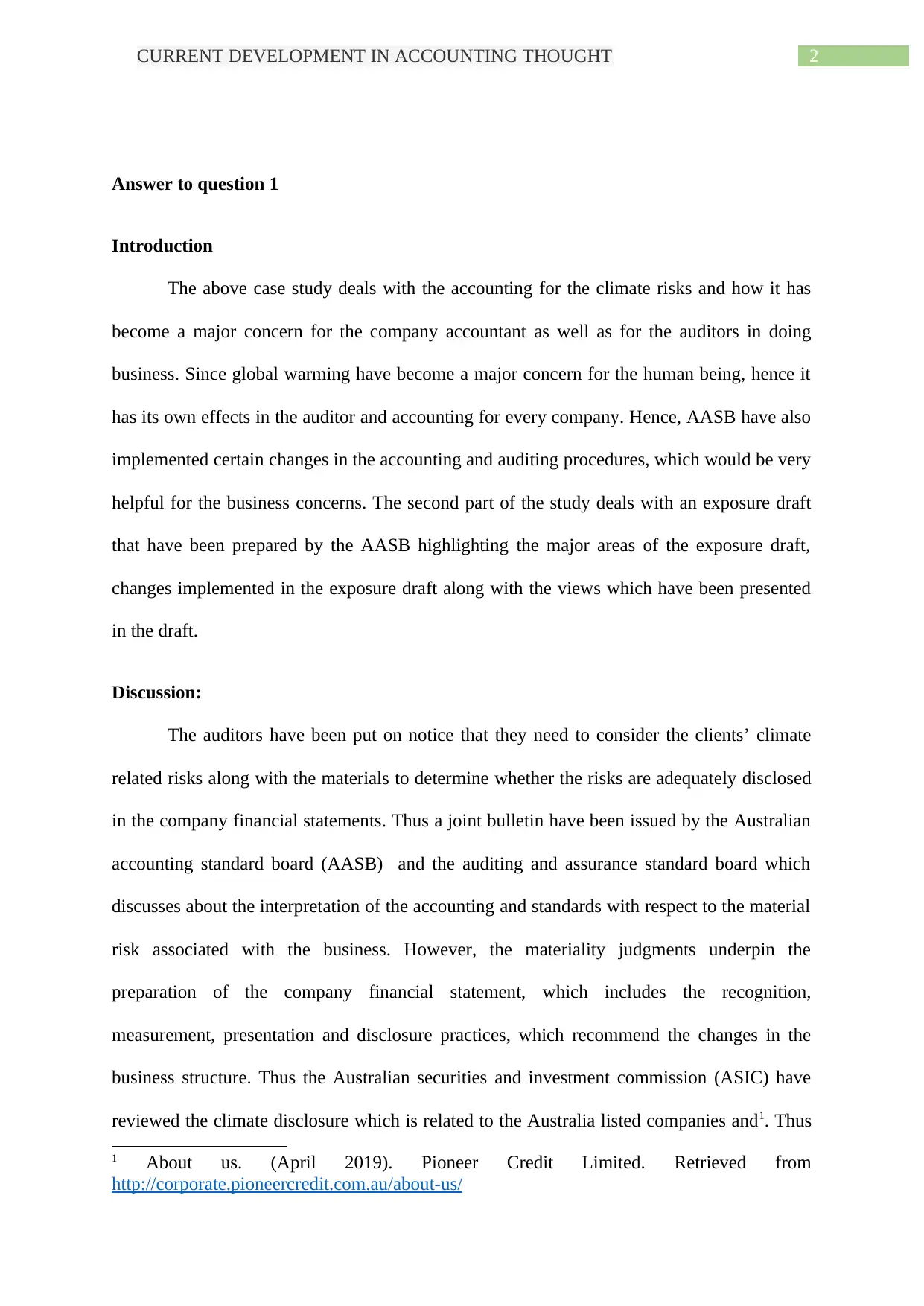
2CURRENT DEVELOPMENT IN ACCOUNTING THOUGHT
Answer to question 1
Introduction
The above case study deals with the accounting for the climate risks and how it has
become a major concern for the company accountant as well as for the auditors in doing
business. Since global warming have become a major concern for the human being, hence it
has its own effects in the auditor and accounting for every company. Hence, AASB have also
implemented certain changes in the accounting and auditing procedures, which would be very
helpful for the business concerns. The second part of the study deals with an exposure draft
that have been prepared by the AASB highlighting the major areas of the exposure draft,
changes implemented in the exposure draft along with the views which have been presented
in the draft.
Discussion:
The auditors have been put on notice that they need to consider the clients’ climate
related risks along with the materials to determine whether the risks are adequately disclosed
in the company financial statements. Thus a joint bulletin have been issued by the Australian
accounting standard board (AASB) and the auditing and assurance standard board which
discusses about the interpretation of the accounting and standards with respect to the material
risk associated with the business. However, the materiality judgments underpin the
preparation of the company financial statement, which includes the recognition,
measurement, presentation and disclosure practices, which recommend the changes in the
business structure. Thus the Australian securities and investment commission (ASIC) have
reviewed the climate disclosure which is related to the Australia listed companies and1. Thus
1 About us. (April 2019). Pioneer Credit Limited. Retrieved from
http://corporate.pioneercredit.com.au/about-us/
Answer to question 1
Introduction
The above case study deals with the accounting for the climate risks and how it has
become a major concern for the company accountant as well as for the auditors in doing
business. Since global warming have become a major concern for the human being, hence it
has its own effects in the auditor and accounting for every company. Hence, AASB have also
implemented certain changes in the accounting and auditing procedures, which would be very
helpful for the business concerns. The second part of the study deals with an exposure draft
that have been prepared by the AASB highlighting the major areas of the exposure draft,
changes implemented in the exposure draft along with the views which have been presented
in the draft.
Discussion:
The auditors have been put on notice that they need to consider the clients’ climate
related risks along with the materials to determine whether the risks are adequately disclosed
in the company financial statements. Thus a joint bulletin have been issued by the Australian
accounting standard board (AASB) and the auditing and assurance standard board which
discusses about the interpretation of the accounting and standards with respect to the material
risk associated with the business. However, the materiality judgments underpin the
preparation of the company financial statement, which includes the recognition,
measurement, presentation and disclosure practices, which recommend the changes in the
business structure. Thus the Australian securities and investment commission (ASIC) have
reviewed the climate disclosure which is related to the Australia listed companies and1. Thus
1 About us. (April 2019). Pioneer Credit Limited. Retrieved from
http://corporate.pioneercredit.com.au/about-us/
⊘ This is a preview!⊘
Do you want full access?
Subscribe today to unlock all pages.

Trusted by 1+ million students worldwide
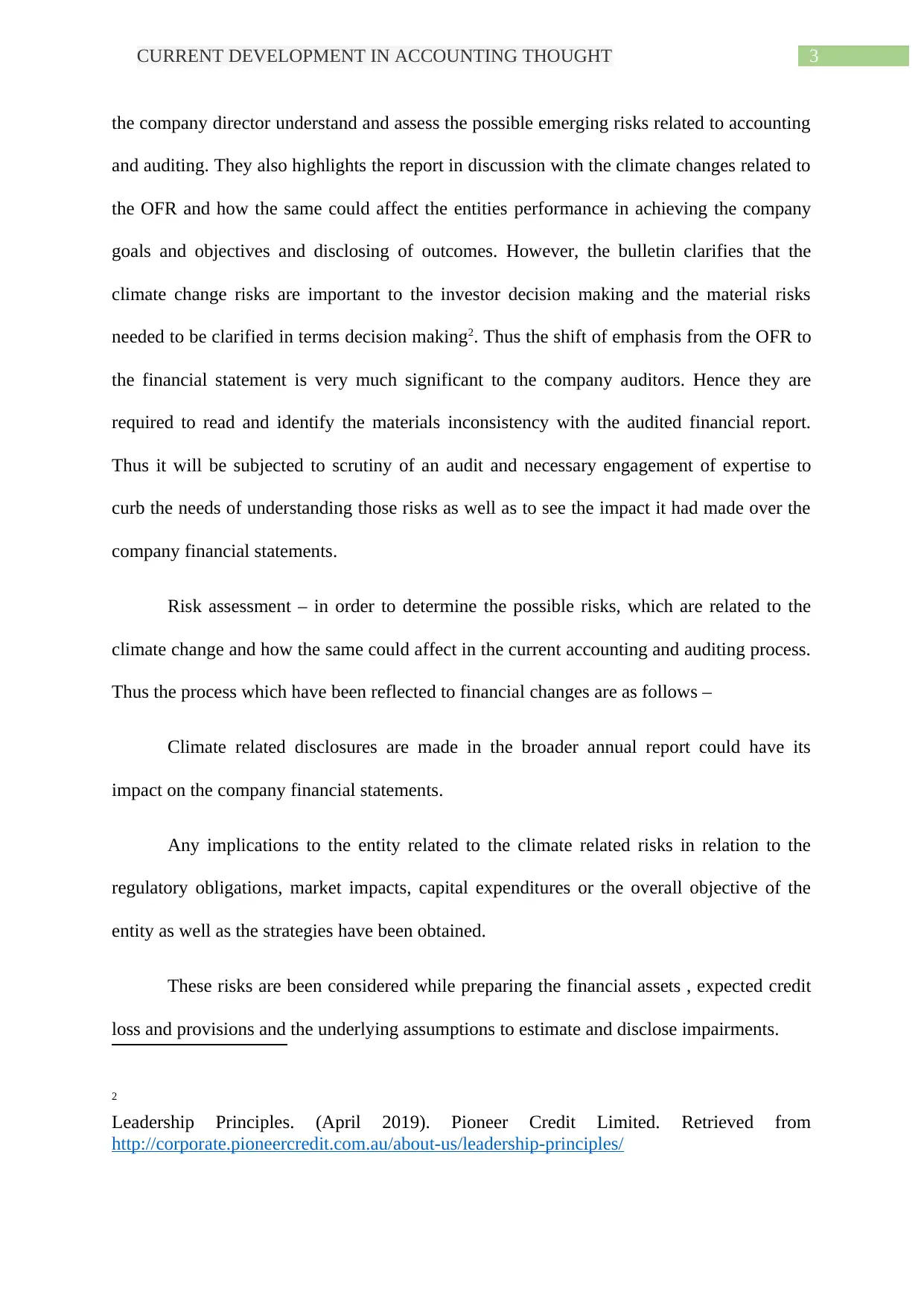
3CURRENT DEVELOPMENT IN ACCOUNTING THOUGHT
the company director understand and assess the possible emerging risks related to accounting
and auditing. They also highlights the report in discussion with the climate changes related to
the OFR and how the same could affect the entities performance in achieving the company
goals and objectives and disclosing of outcomes. However, the bulletin clarifies that the
climate change risks are important to the investor decision making and the material risks
needed to be clarified in terms decision making2. Thus the shift of emphasis from the OFR to
the financial statement is very much significant to the company auditors. Hence they are
required to read and identify the materials inconsistency with the audited financial report.
Thus it will be subjected to scrutiny of an audit and necessary engagement of expertise to
curb the needs of understanding those risks as well as to see the impact it had made over the
company financial statements.
Risk assessment – in order to determine the possible risks, which are related to the
climate change and how the same could affect in the current accounting and auditing process.
Thus the process which have been reflected to financial changes are as follows –
Climate related disclosures are made in the broader annual report could have its
impact on the company financial statements.
Any implications to the entity related to the climate related risks in relation to the
regulatory obligations, market impacts, capital expenditures or the overall objective of the
entity as well as the strategies have been obtained.
These risks are been considered while preparing the financial assets , expected credit
loss and provisions and the underlying assumptions to estimate and disclose impairments.
2
Leadership Principles. (April 2019). Pioneer Credit Limited. Retrieved from
http://corporate.pioneercredit.com.au/about-us/leadership-principles/
the company director understand and assess the possible emerging risks related to accounting
and auditing. They also highlights the report in discussion with the climate changes related to
the OFR and how the same could affect the entities performance in achieving the company
goals and objectives and disclosing of outcomes. However, the bulletin clarifies that the
climate change risks are important to the investor decision making and the material risks
needed to be clarified in terms decision making2. Thus the shift of emphasis from the OFR to
the financial statement is very much significant to the company auditors. Hence they are
required to read and identify the materials inconsistency with the audited financial report.
Thus it will be subjected to scrutiny of an audit and necessary engagement of expertise to
curb the needs of understanding those risks as well as to see the impact it had made over the
company financial statements.
Risk assessment – in order to determine the possible risks, which are related to the
climate change and how the same could affect in the current accounting and auditing process.
Thus the process which have been reflected to financial changes are as follows –
Climate related disclosures are made in the broader annual report could have its
impact on the company financial statements.
Any implications to the entity related to the climate related risks in relation to the
regulatory obligations, market impacts, capital expenditures or the overall objective of the
entity as well as the strategies have been obtained.
These risks are been considered while preparing the financial assets , expected credit
loss and provisions and the underlying assumptions to estimate and disclose impairments.
2
Leadership Principles. (April 2019). Pioneer Credit Limited. Retrieved from
http://corporate.pioneercredit.com.au/about-us/leadership-principles/
Paraphrase This Document
Need a fresh take? Get an instant paraphrase of this document with our AI Paraphraser
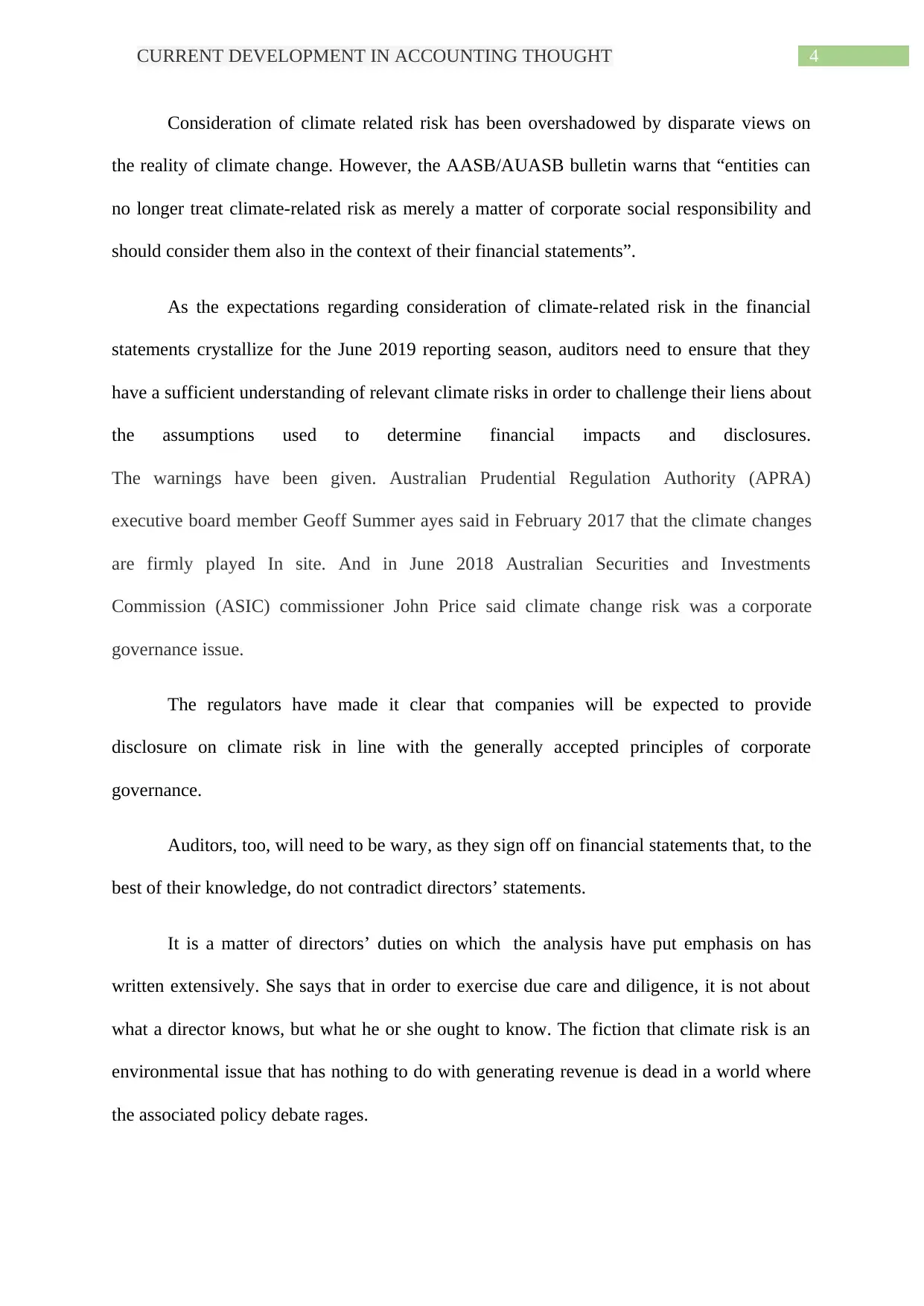
4CURRENT DEVELOPMENT IN ACCOUNTING THOUGHT
Consideration of climate related risk has been overshadowed by disparate views on
the reality of climate change. However, the AASB/AUASB bulletin warns that “entities can
no longer treat climate-related risk as merely a matter of corporate social responsibility and
should consider them also in the context of their financial statements”.
As the expectations regarding consideration of climate-related risk in the financial
statements crystallize for the June 2019 reporting season, auditors need to ensure that they
have a sufficient understanding of relevant climate risks in order to challenge their liens about
the assumptions used to determine financial impacts and disclosures.
The warnings have been given. Australian Prudential Regulation Authority (APRA)
executive board member Geoff Summer ayes said in February 2017 that the climate changes
are firmly played In site. And in June 2018 Australian Securities and Investments
Commission (ASIC) commissioner John Price said climate change risk was a corporate
governance issue.
The regulators have made it clear that companies will be expected to provide
disclosure on climate risk in line with the generally accepted principles of corporate
governance.
Auditors, too, will need to be wary, as they sign off on financial statements that, to the
best of their knowledge, do not contradict directors’ statements.
It is a matter of directors’ duties on which the analysis have put emphasis on has
written extensively. She says that in order to exercise due care and diligence, it is not about
what a director knows, but what he or she ought to know. The fiction that climate risk is an
environmental issue that has nothing to do with generating revenue is dead in a world where
the associated policy debate rages.
Consideration of climate related risk has been overshadowed by disparate views on
the reality of climate change. However, the AASB/AUASB bulletin warns that “entities can
no longer treat climate-related risk as merely a matter of corporate social responsibility and
should consider them also in the context of their financial statements”.
As the expectations regarding consideration of climate-related risk in the financial
statements crystallize for the June 2019 reporting season, auditors need to ensure that they
have a sufficient understanding of relevant climate risks in order to challenge their liens about
the assumptions used to determine financial impacts and disclosures.
The warnings have been given. Australian Prudential Regulation Authority (APRA)
executive board member Geoff Summer ayes said in February 2017 that the climate changes
are firmly played In site. And in June 2018 Australian Securities and Investments
Commission (ASIC) commissioner John Price said climate change risk was a corporate
governance issue.
The regulators have made it clear that companies will be expected to provide
disclosure on climate risk in line with the generally accepted principles of corporate
governance.
Auditors, too, will need to be wary, as they sign off on financial statements that, to the
best of their knowledge, do not contradict directors’ statements.
It is a matter of directors’ duties on which the analysis have put emphasis on has
written extensively. She says that in order to exercise due care and diligence, it is not about
what a director knows, but what he or she ought to know. The fiction that climate risk is an
environmental issue that has nothing to do with generating revenue is dead in a world where
the associated policy debate rages.
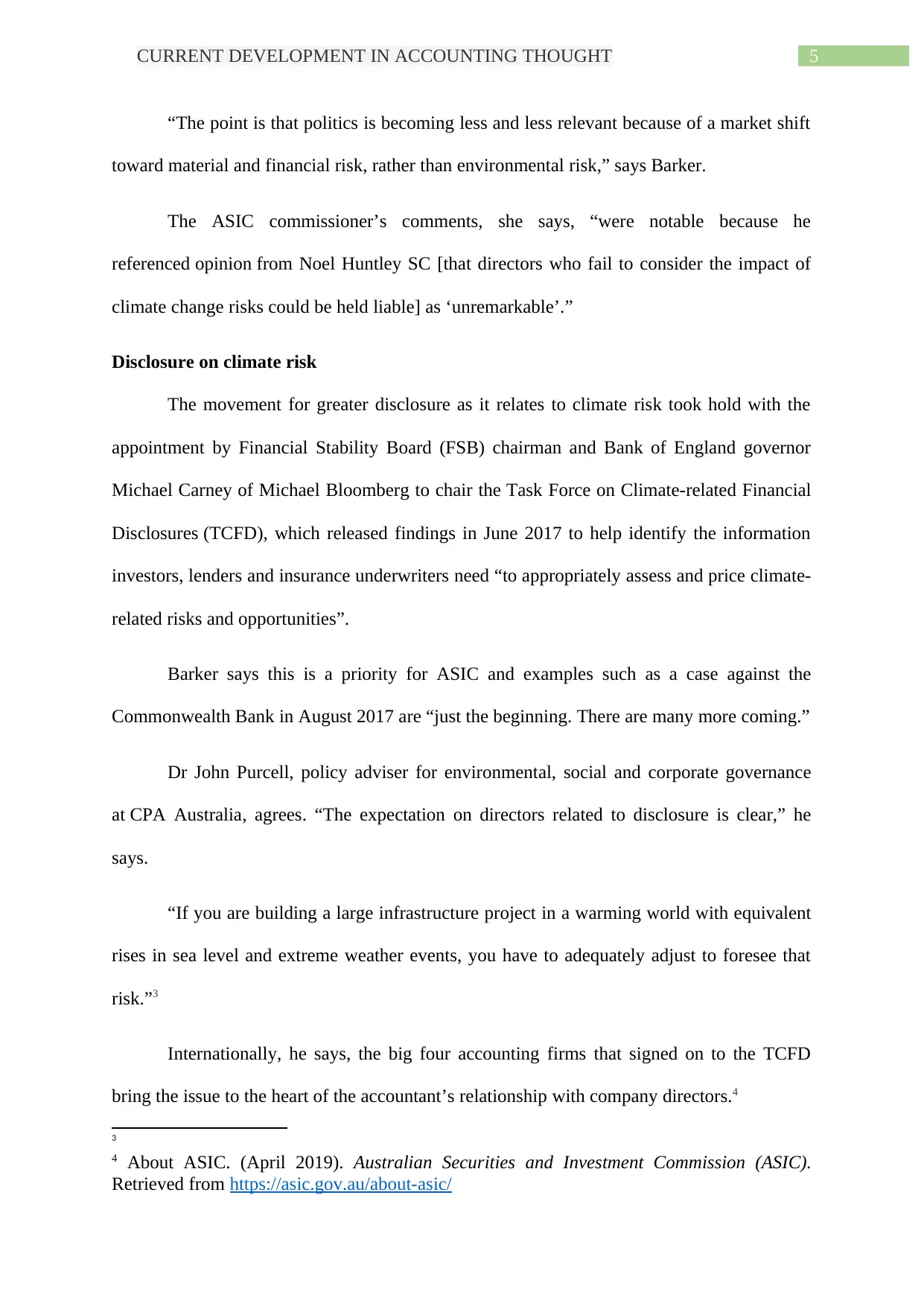
5CURRENT DEVELOPMENT IN ACCOUNTING THOUGHT
“The point is that politics is becoming less and less relevant because of a market shift
toward material and financial risk, rather than environmental risk,” says Barker.
The ASIC commissioner’s comments, she says, “were notable because he
referenced opinion from Noel Huntley SC [that directors who fail to consider the impact of
climate change risks could be held liable] as ‘unremarkable’.”
Disclosure on climate risk
The movement for greater disclosure as it relates to climate risk took hold with the
appointment by Financial Stability Board (FSB) chairman and Bank of England governor
Michael Carney of Michael Bloomberg to chair the Task Force on Climate-related Financial
Disclosures (TCFD), which released findings in June 2017 to help identify the information
investors, lenders and insurance underwriters need “to appropriately assess and price climate-
related risks and opportunities”.
Barker says this is a priority for ASIC and examples such as a case against the
Commonwealth Bank in August 2017 are “just the beginning. There are many more coming.”
Dr John Purcell, policy adviser for environmental, social and corporate governance
at CPA Australia, agrees. “The expectation on directors related to disclosure is clear,” he
says.
“If you are building a large infrastructure project in a warming world with equivalent
rises in sea level and extreme weather events, you have to adequately adjust to foresee that
risk.”3
Internationally, he says, the big four accounting firms that signed on to the TCFD
bring the issue to the heart of the accountant’s relationship with company directors.4
3
4 About ASIC. (April 2019). Australian Securities and Investment Commission (ASIC).
Retrieved from https://asic.gov.au/about-asic/
“The point is that politics is becoming less and less relevant because of a market shift
toward material and financial risk, rather than environmental risk,” says Barker.
The ASIC commissioner’s comments, she says, “were notable because he
referenced opinion from Noel Huntley SC [that directors who fail to consider the impact of
climate change risks could be held liable] as ‘unremarkable’.”
Disclosure on climate risk
The movement for greater disclosure as it relates to climate risk took hold with the
appointment by Financial Stability Board (FSB) chairman and Bank of England governor
Michael Carney of Michael Bloomberg to chair the Task Force on Climate-related Financial
Disclosures (TCFD), which released findings in June 2017 to help identify the information
investors, lenders and insurance underwriters need “to appropriately assess and price climate-
related risks and opportunities”.
Barker says this is a priority for ASIC and examples such as a case against the
Commonwealth Bank in August 2017 are “just the beginning. There are many more coming.”
Dr John Purcell, policy adviser for environmental, social and corporate governance
at CPA Australia, agrees. “The expectation on directors related to disclosure is clear,” he
says.
“If you are building a large infrastructure project in a warming world with equivalent
rises in sea level and extreme weather events, you have to adequately adjust to foresee that
risk.”3
Internationally, he says, the big four accounting firms that signed on to the TCFD
bring the issue to the heart of the accountant’s relationship with company directors.4
3
4 About ASIC. (April 2019). Australian Securities and Investment Commission (ASIC).
Retrieved from https://asic.gov.au/about-asic/
⊘ This is a preview!⊘
Do you want full access?
Subscribe today to unlock all pages.

Trusted by 1+ million students worldwide
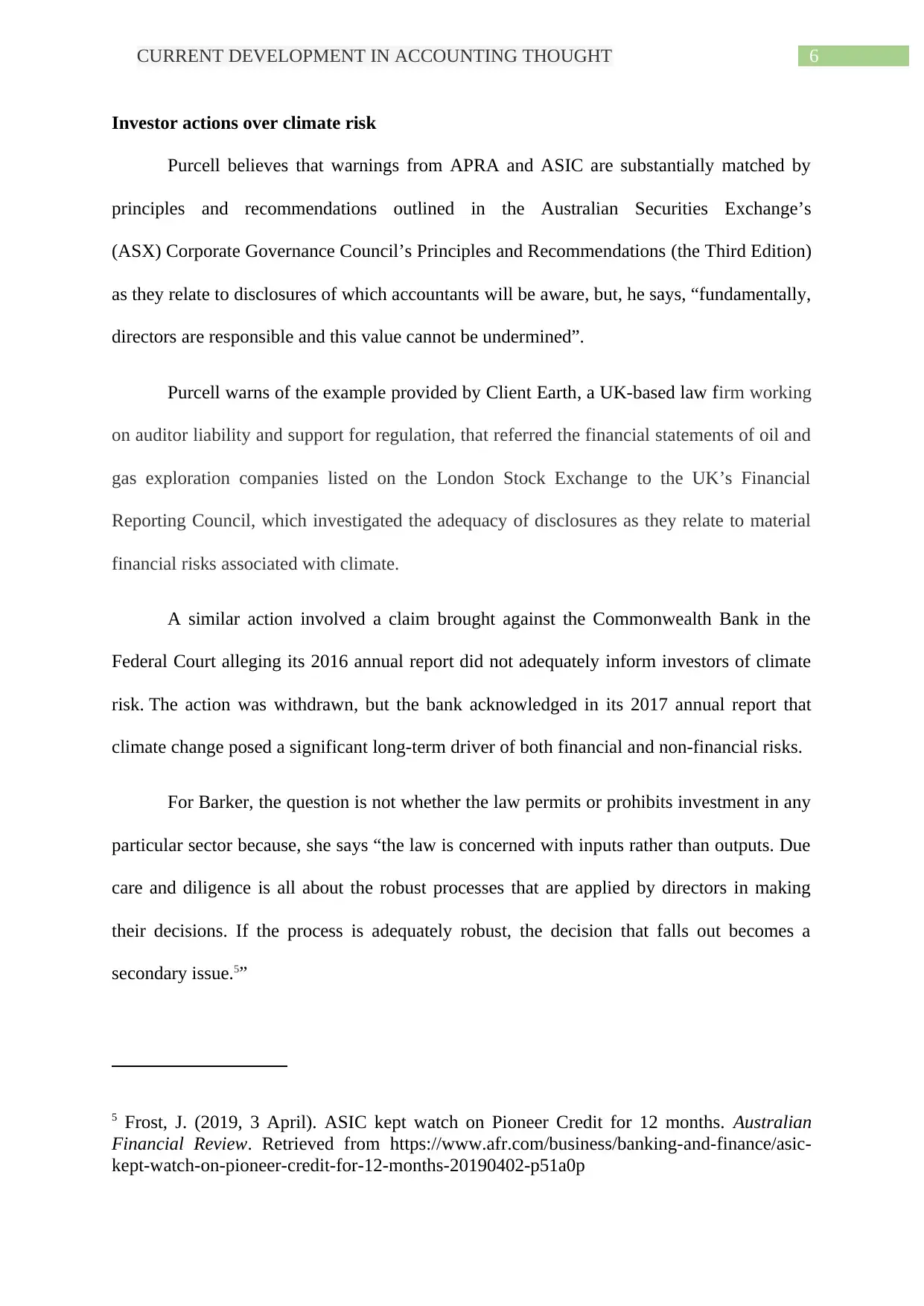
6CURRENT DEVELOPMENT IN ACCOUNTING THOUGHT
Investor actions over climate risk
Purcell believes that warnings from APRA and ASIC are substantially matched by
principles and recommendations outlined in the Australian Securities Exchange’s
(ASX) Corporate Governance Council’s Principles and Recommendations (the Third Edition)
as they relate to disclosures of which accountants will be aware, but, he says, “fundamentally,
directors are responsible and this value cannot be undermined”.
Purcell warns of the example provided by Client Earth, a UK-based law firm working
on auditor liability and support for regulation, that referred the financial statements of oil and
gas exploration companies listed on the London Stock Exchange to the UK’s Financial
Reporting Council, which investigated the adequacy of disclosures as they relate to material
financial risks associated with climate.
A similar action involved a claim brought against the Commonwealth Bank in the
Federal Court alleging its 2016 annual report did not adequately inform investors of climate
risk. The action was withdrawn, but the bank acknowledged in its 2017 annual report that
climate change posed a significant long-term driver of both financial and non-financial risks.
For Barker, the question is not whether the law permits or prohibits investment in any
particular sector because, she says “the law is concerned with inputs rather than outputs. Due
care and diligence is all about the robust processes that are applied by directors in making
their decisions. If the process is adequately robust, the decision that falls out becomes a
secondary issue.5”
5 Frost, J. (2019, 3 April). ASIC kept watch on Pioneer Credit for 12 months. Australian
Financial Review. Retrieved from https://www.afr.com/business/banking-and-finance/asic-
kept-watch-on-pioneer-credit-for-12-months-20190402-p51a0p
Investor actions over climate risk
Purcell believes that warnings from APRA and ASIC are substantially matched by
principles and recommendations outlined in the Australian Securities Exchange’s
(ASX) Corporate Governance Council’s Principles and Recommendations (the Third Edition)
as they relate to disclosures of which accountants will be aware, but, he says, “fundamentally,
directors are responsible and this value cannot be undermined”.
Purcell warns of the example provided by Client Earth, a UK-based law firm working
on auditor liability and support for regulation, that referred the financial statements of oil and
gas exploration companies listed on the London Stock Exchange to the UK’s Financial
Reporting Council, which investigated the adequacy of disclosures as they relate to material
financial risks associated with climate.
A similar action involved a claim brought against the Commonwealth Bank in the
Federal Court alleging its 2016 annual report did not adequately inform investors of climate
risk. The action was withdrawn, but the bank acknowledged in its 2017 annual report that
climate change posed a significant long-term driver of both financial and non-financial risks.
For Barker, the question is not whether the law permits or prohibits investment in any
particular sector because, she says “the law is concerned with inputs rather than outputs. Due
care and diligence is all about the robust processes that are applied by directors in making
their decisions. If the process is adequately robust, the decision that falls out becomes a
secondary issue.5”
5 Frost, J. (2019, 3 April). ASIC kept watch on Pioneer Credit for 12 months. Australian
Financial Review. Retrieved from https://www.afr.com/business/banking-and-finance/asic-
kept-watch-on-pioneer-credit-for-12-months-20190402-p51a0p
Paraphrase This Document
Need a fresh take? Get an instant paraphrase of this document with our AI Paraphraser
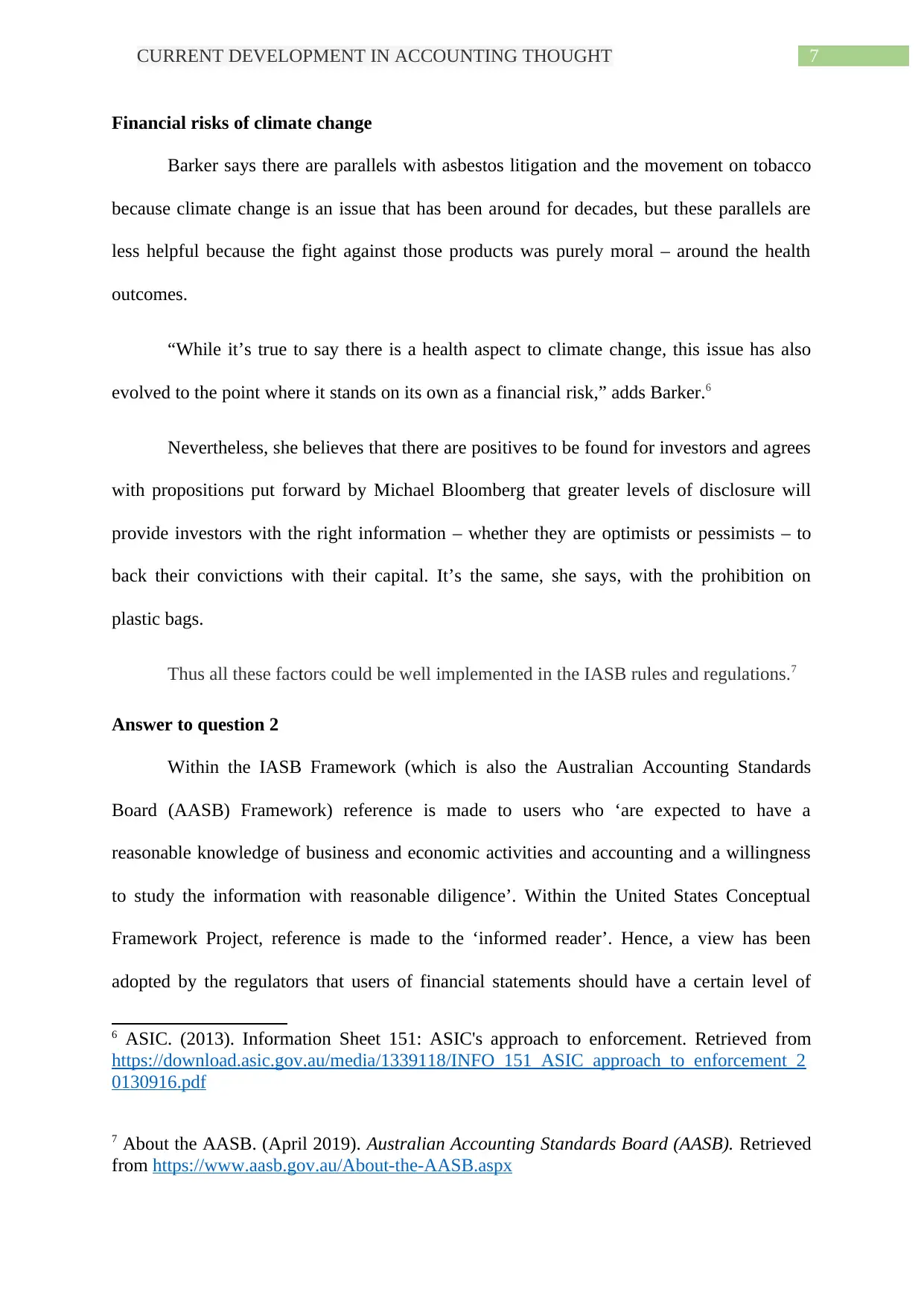
7CURRENT DEVELOPMENT IN ACCOUNTING THOUGHT
Financial risks of climate change
Barker says there are parallels with asbestos litigation and the movement on tobacco
because climate change is an issue that has been around for decades, but these parallels are
less helpful because the fight against those products was purely moral – around the health
outcomes.
“While it’s true to say there is a health aspect to climate change, this issue has also
evolved to the point where it stands on its own as a financial risk,” adds Barker.6
Nevertheless, she believes that there are positives to be found for investors and agrees
with propositions put forward by Michael Bloomberg that greater levels of disclosure will
provide investors with the right information – whether they are optimists or pessimists – to
back their convictions with their capital. It’s the same, she says, with the prohibition on
plastic bags.
Thus all these factors could be well implemented in the IASB rules and regulations.7
Answer to question 2
Within the IASB Framework (which is also the Australian Accounting Standards
Board (AASB) Framework) reference is made to users who ‘are expected to have a
reasonable knowledge of business and economic activities and accounting and a willingness
to study the information with reasonable diligence’. Within the United States Conceptual
Framework Project, reference is made to the ‘informed reader’. Hence, a view has been
adopted by the regulators that users of financial statements should have a certain level of
6 ASIC. (2013). Information Sheet 151: ASIC's approach to enforcement. Retrieved from
https://download.asic.gov.au/media/1339118/INFO_151_ASIC_approach_to_enforcement_2
0130916.pdf
7 About the AASB. (April 2019). Australian Accounting Standards Board (AASB). Retrieved
from https://www.aasb.gov.au/About-the-AASB.aspx
Financial risks of climate change
Barker says there are parallels with asbestos litigation and the movement on tobacco
because climate change is an issue that has been around for decades, but these parallels are
less helpful because the fight against those products was purely moral – around the health
outcomes.
“While it’s true to say there is a health aspect to climate change, this issue has also
evolved to the point where it stands on its own as a financial risk,” adds Barker.6
Nevertheless, she believes that there are positives to be found for investors and agrees
with propositions put forward by Michael Bloomberg that greater levels of disclosure will
provide investors with the right information – whether they are optimists or pessimists – to
back their convictions with their capital. It’s the same, she says, with the prohibition on
plastic bags.
Thus all these factors could be well implemented in the IASB rules and regulations.7
Answer to question 2
Within the IASB Framework (which is also the Australian Accounting Standards
Board (AASB) Framework) reference is made to users who ‘are expected to have a
reasonable knowledge of business and economic activities and accounting and a willingness
to study the information with reasonable diligence’. Within the United States Conceptual
Framework Project, reference is made to the ‘informed reader’. Hence, a view has been
adopted by the regulators that users of financial statements should have a certain level of
6 ASIC. (2013). Information Sheet 151: ASIC's approach to enforcement. Retrieved from
https://download.asic.gov.au/media/1339118/INFO_151_ASIC_approach_to_enforcement_2
0130916.pdf
7 About the AASB. (April 2019). Australian Accounting Standards Board (AASB). Retrieved
from https://www.aasb.gov.au/About-the-AASB.aspx
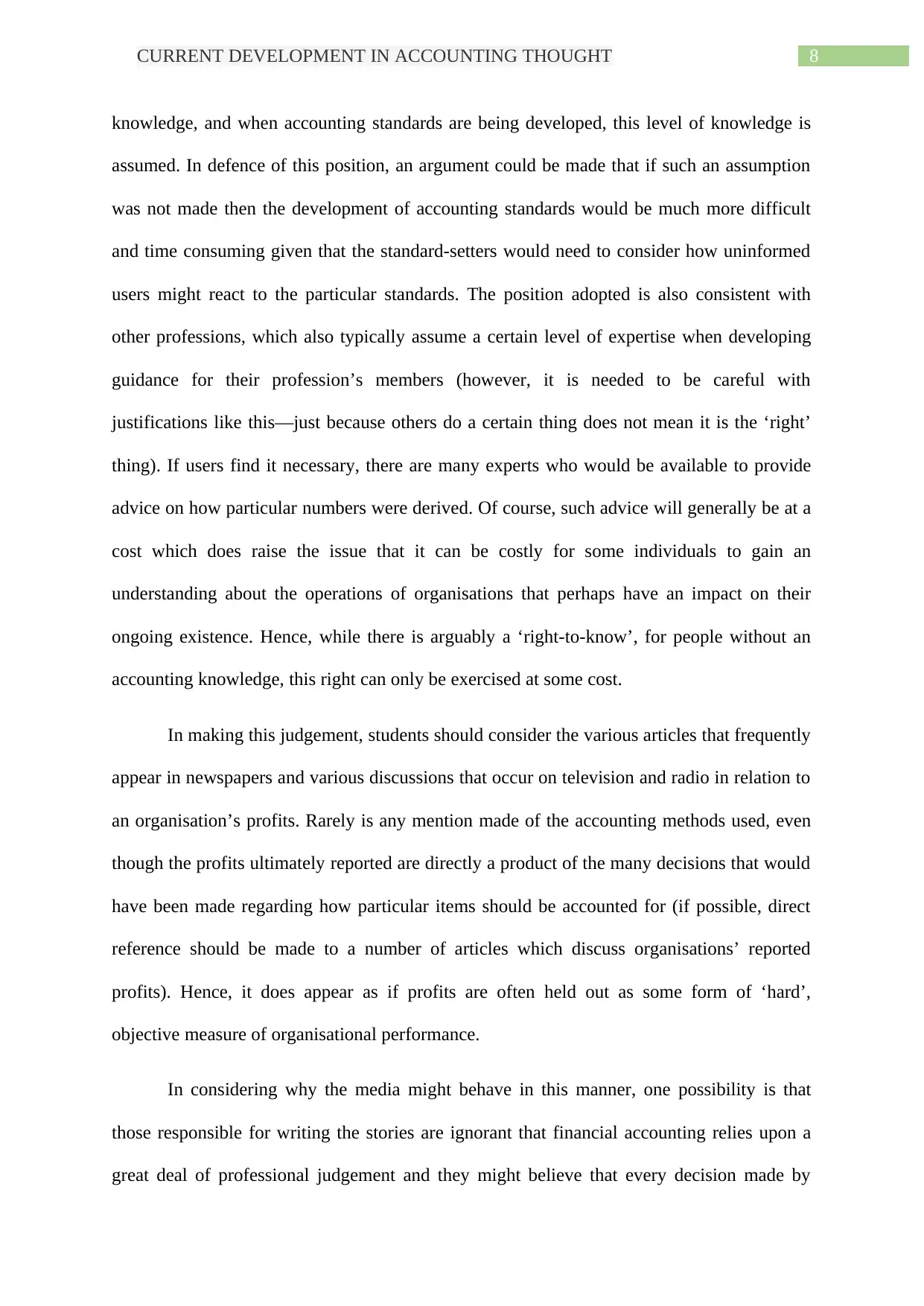
8CURRENT DEVELOPMENT IN ACCOUNTING THOUGHT
knowledge, and when accounting standards are being developed, this level of knowledge is
assumed. In defence of this position, an argument could be made that if such an assumption
was not made then the development of accounting standards would be much more difficult
and time consuming given that the standard-setters would need to consider how uninformed
users might react to the particular standards. The position adopted is also consistent with
other professions, which also typically assume a certain level of expertise when developing
guidance for their profession’s members (however, it is needed to be careful with
justifications like this—just because others do a certain thing does not mean it is the ‘right’
thing). If users find it necessary, there are many experts who would be available to provide
advice on how particular numbers were derived. Of course, such advice will generally be at a
cost which does raise the issue that it can be costly for some individuals to gain an
understanding about the operations of organisations that perhaps have an impact on their
ongoing existence. Hence, while there is arguably a ‘right-to-know’, for people without an
accounting knowledge, this right can only be exercised at some cost.
In making this judgement, students should consider the various articles that frequently
appear in newspapers and various discussions that occur on television and radio in relation to
an organisation’s profits. Rarely is any mention made of the accounting methods used, even
though the profits ultimately reported are directly a product of the many decisions that would
have been made regarding how particular items should be accounted for (if possible, direct
reference should be made to a number of articles which discuss organisations’ reported
profits). Hence, it does appear as if profits are often held out as some form of ‘hard’,
objective measure of organisational performance.
In considering why the media might behave in this manner, one possibility is that
those responsible for writing the stories are ignorant that financial accounting relies upon a
great deal of professional judgement and they might believe that every decision made by
knowledge, and when accounting standards are being developed, this level of knowledge is
assumed. In defence of this position, an argument could be made that if such an assumption
was not made then the development of accounting standards would be much more difficult
and time consuming given that the standard-setters would need to consider how uninformed
users might react to the particular standards. The position adopted is also consistent with
other professions, which also typically assume a certain level of expertise when developing
guidance for their profession’s members (however, it is needed to be careful with
justifications like this—just because others do a certain thing does not mean it is the ‘right’
thing). If users find it necessary, there are many experts who would be available to provide
advice on how particular numbers were derived. Of course, such advice will generally be at a
cost which does raise the issue that it can be costly for some individuals to gain an
understanding about the operations of organisations that perhaps have an impact on their
ongoing existence. Hence, while there is arguably a ‘right-to-know’, for people without an
accounting knowledge, this right can only be exercised at some cost.
In making this judgement, students should consider the various articles that frequently
appear in newspapers and various discussions that occur on television and radio in relation to
an organisation’s profits. Rarely is any mention made of the accounting methods used, even
though the profits ultimately reported are directly a product of the many decisions that would
have been made regarding how particular items should be accounted for (if possible, direct
reference should be made to a number of articles which discuss organisations’ reported
profits). Hence, it does appear as if profits are often held out as some form of ‘hard’,
objective measure of organisational performance.
In considering why the media might behave in this manner, one possibility is that
those responsible for writing the stories are ignorant that financial accounting relies upon a
great deal of professional judgement and they might believe that every decision made by
⊘ This is a preview!⊘
Do you want full access?
Subscribe today to unlock all pages.

Trusted by 1+ million students worldwide
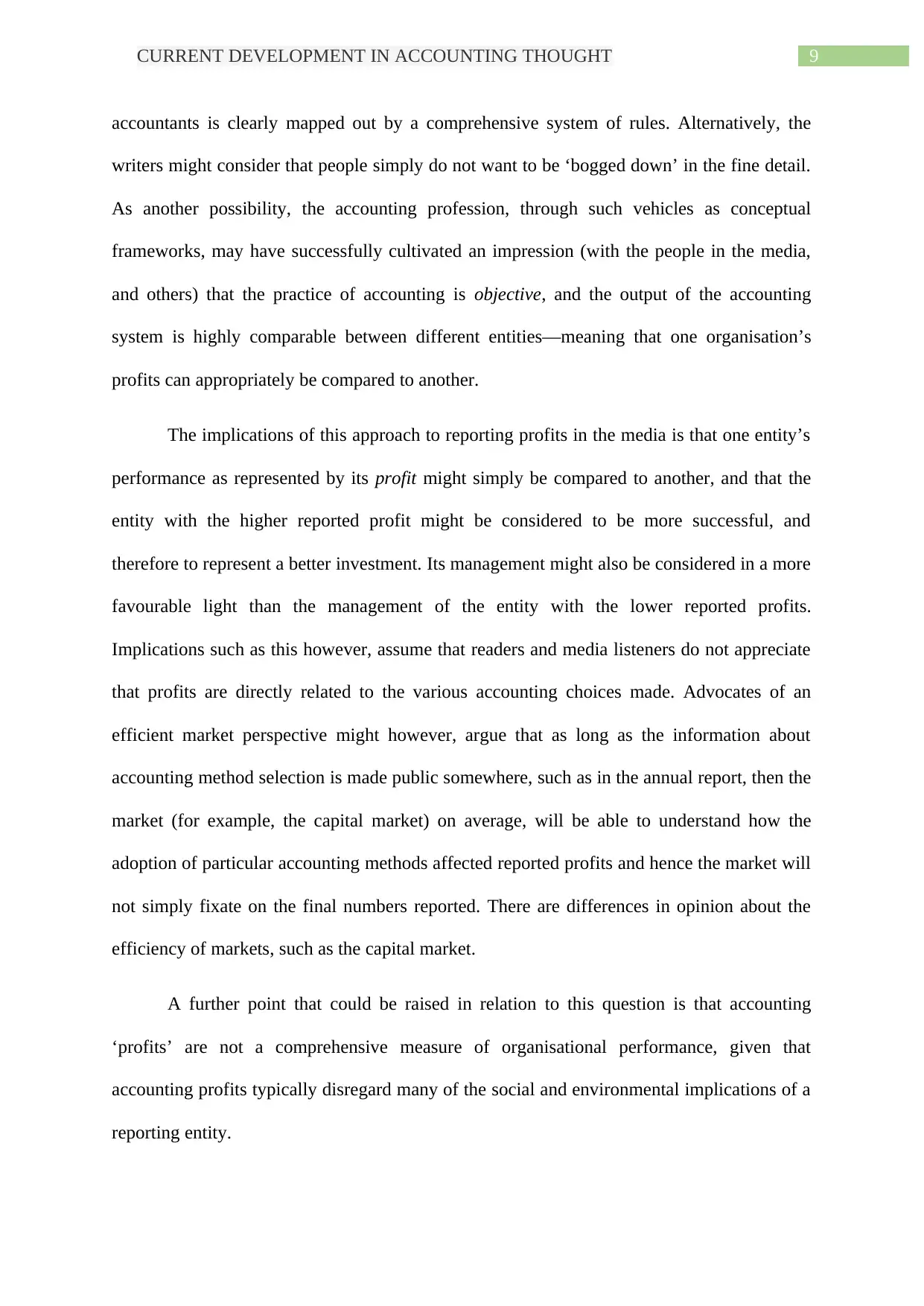
9CURRENT DEVELOPMENT IN ACCOUNTING THOUGHT
accountants is clearly mapped out by a comprehensive system of rules. Alternatively, the
writers might consider that people simply do not want to be ‘bogged down’ in the fine detail.
As another possibility, the accounting profession, through such vehicles as conceptual
frameworks, may have successfully cultivated an impression (with the people in the media,
and others) that the practice of accounting is objective, and the output of the accounting
system is highly comparable between different entities—meaning that one organisation’s
profits can appropriately be compared to another.
The implications of this approach to reporting profits in the media is that one entity’s
performance as represented by its profit might simply be compared to another, and that the
entity with the higher reported profit might be considered to be more successful, and
therefore to represent a better investment. Its management might also be considered in a more
favourable light than the management of the entity with the lower reported profits.
Implications such as this however, assume that readers and media listeners do not appreciate
that profits are directly related to the various accounting choices made. Advocates of an
efficient market perspective might however, argue that as long as the information about
accounting method selection is made public somewhere, such as in the annual report, then the
market (for example, the capital market) on average, will be able to understand how the
adoption of particular accounting methods affected reported profits and hence the market will
not simply fixate on the final numbers reported. There are differences in opinion about the
efficiency of markets, such as the capital market.
A further point that could be raised in relation to this question is that accounting
‘profits’ are not a comprehensive measure of organisational performance, given that
accounting profits typically disregard many of the social and environmental implications of a
reporting entity.
accountants is clearly mapped out by a comprehensive system of rules. Alternatively, the
writers might consider that people simply do not want to be ‘bogged down’ in the fine detail.
As another possibility, the accounting profession, through such vehicles as conceptual
frameworks, may have successfully cultivated an impression (with the people in the media,
and others) that the practice of accounting is objective, and the output of the accounting
system is highly comparable between different entities—meaning that one organisation’s
profits can appropriately be compared to another.
The implications of this approach to reporting profits in the media is that one entity’s
performance as represented by its profit might simply be compared to another, and that the
entity with the higher reported profit might be considered to be more successful, and
therefore to represent a better investment. Its management might also be considered in a more
favourable light than the management of the entity with the lower reported profits.
Implications such as this however, assume that readers and media listeners do not appreciate
that profits are directly related to the various accounting choices made. Advocates of an
efficient market perspective might however, argue that as long as the information about
accounting method selection is made public somewhere, such as in the annual report, then the
market (for example, the capital market) on average, will be able to understand how the
adoption of particular accounting methods affected reported profits and hence the market will
not simply fixate on the final numbers reported. There are differences in opinion about the
efficiency of markets, such as the capital market.
A further point that could be raised in relation to this question is that accounting
‘profits’ are not a comprehensive measure of organisational performance, given that
accounting profits typically disregard many of the social and environmental implications of a
reporting entity.
Paraphrase This Document
Need a fresh take? Get an instant paraphrase of this document with our AI Paraphraser
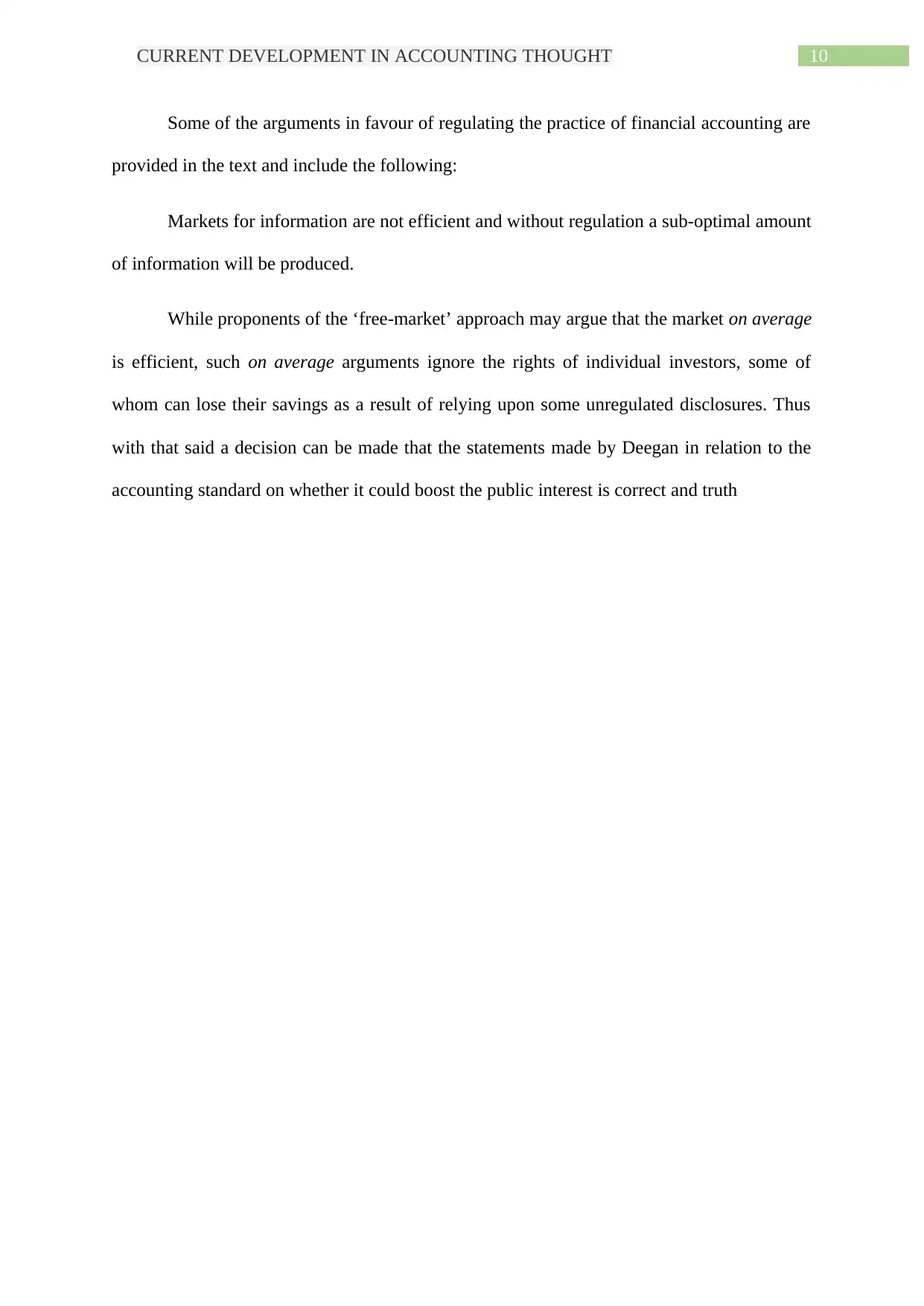
10CURRENT DEVELOPMENT IN ACCOUNTING THOUGHT
Some of the arguments in favour of regulating the practice of financial accounting are
provided in the text and include the following:
Markets for information are not efficient and without regulation a sub-optimal amount
of information will be produced.
While proponents of the ‘free-market’ approach may argue that the market on average
is efficient, such on average arguments ignore the rights of individual investors, some of
whom can lose their savings as a result of relying upon some unregulated disclosures. Thus
with that said a decision can be made that the statements made by Deegan in relation to the
accounting standard on whether it could boost the public interest is correct and truth
Some of the arguments in favour of regulating the practice of financial accounting are
provided in the text and include the following:
Markets for information are not efficient and without regulation a sub-optimal amount
of information will be produced.
While proponents of the ‘free-market’ approach may argue that the market on average
is efficient, such on average arguments ignore the rights of individual investors, some of
whom can lose their savings as a result of relying upon some unregulated disclosures. Thus
with that said a decision can be made that the statements made by Deegan in relation to the
accounting standard on whether it could boost the public interest is correct and truth
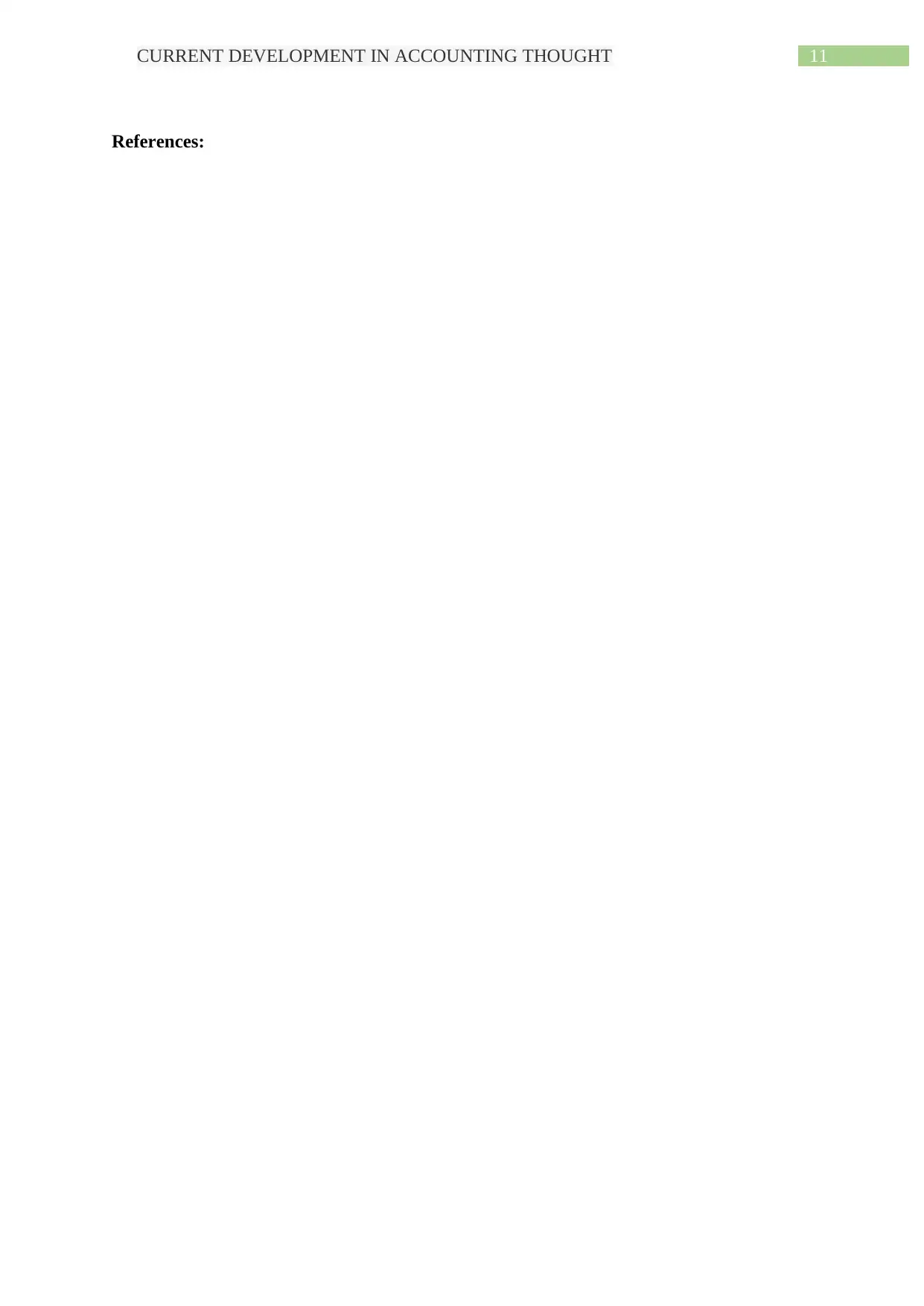
11CURRENT DEVELOPMENT IN ACCOUNTING THOUGHT
References:
References:
⊘ This is a preview!⊘
Do you want full access?
Subscribe today to unlock all pages.

Trusted by 1+ million students worldwide
1 out of 17
Related Documents
Your All-in-One AI-Powered Toolkit for Academic Success.
+13062052269
info@desklib.com
Available 24*7 on WhatsApp / Email
![[object Object]](/_next/static/media/star-bottom.7253800d.svg)
Unlock your academic potential
Copyright © 2020–2025 A2Z Services. All Rights Reserved. Developed and managed by ZUCOL.




